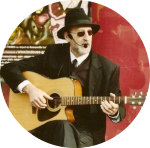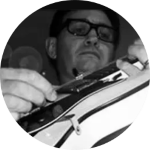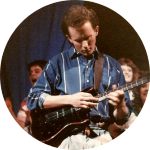In this post, which is a first here at Guitar Domination I have asked 15 of my favourite guitarists/teachers from all around the world to share their best advice on how you can improve your guitar skills.
There are some absolute nuggets of gold dust shared in this post and some unique ideas that you may not have considered.
I asked them all a very important question…
“What is your most useful tip on the best way to learn guitar for beginner guitarists?”
There is no single ‘best way to learn guitar’ of course, but learning from a variety of experienced tutors and players will certainly get you thinking outside the box – particularly if you have found yourself in a rut with your guitar playing.
There is a fascinating variety of information here.
Even for me, who is someone who has played for a long time, I found these tips really interesting, so I think all players will learn a thing or two here. Just think of the many 10,000’s of lessons taught by these guys and enjoy what they have to say.
Take a look, learn plenty, share it about and leave a comment with your favourite tip at the bottom.
Enjoy!
15 of my favourite guitarists share their tips on the best way to learn guitar
 Tomas Michaud – Flamenco Guitar Teacher
Tomas Michaud – Flamenco Guitar Teacher
TomasMichaud.com
“A mistake I made early on was to practice whatever I felt like in the moment. It wasn’t long before I realized that it’s really hard to get good at anything when there’s no consistency. To make matters worse I naturally felt like practicing the things that came easy to me, and I didn’t feel like practicing the things that I really needed to work on.
Here’s an example of a 30-minute practice session for a beginner.
- Start with a warm-up (3 min.) This is something fairly easy and repetitive that will get your fingers moving, but at the same time allow you to focus on accuracy and stay relaxed.
- Move on to a progressive exercise (10 min.) Something that will help you to work on a specific skill. If you are working on chords you might use an exercise that allows you to change between several chords.
- Work on some longer material (12 min.) This could be a song you’re working on or a more complex exercise. It should be something that will take a longer period to actually learn and master.
- Close up with something easy and fun (5 min.) End the session on a positive note with something that you like and comes fairly easy. This gives you something to look forward to and makes it easier to want to practice the next time.
Decide ahead of time what to practice and organise your sessions to get the most out of your practice time. Keep track of your progress.”
 Stuart Bahn – UK Guitar Teacher
Stuart Bahn – UK Guitar Teacher
StuartBahn.com
“One of the best pieces of advice I was ever given was to work on my time.
As guitarists, we tend to focus disproportionately on technique, at the expense of working on our time. But timing is so important.
One of the best exercises I’ve used for this is just to play a single note along to a very slow metronome; say 40bpm.
- Start with quarter notes; i.e. you play one note on each beat. Really focus on being super-accurate. Record yourself and listen back. Was it perfect? Probably not! So try again.
- After a while you get ‘in the zone’ and it starts to get a little easier. So then try playing 8th notes; i.e. on the beat and off the beat. Again focus on being as accurate as possible. Then try switching back and forth between quarter notes and 8th notes; say a bar each.
- Then try 16th notes. Then try switching back and forth between quarter notes, 8th notes and 16th notes.
- Then try 8th note triplets. These are quite a bit harder to switch accurately back and forth into, so it will take time to get the hang of. Keep going though!
I’d advise doing this regularly for several weeks. This exercise made a huge to me and brought a solidity to my playing that just wasn’t there before.
The nice thing about this timing exercise is that you can do it whilst away from your guitar. Just get a metronome on your phone, plug in your earphones and tap your finger instead of playing a note on the guitar.”
 Jamie Andreas – US Guitar Tutor
Jamie Andreas – US Guitar Tutor
GuitarPrinciples.com
“I often get new students who have been playing for quite awhile. There is a serious flaw that I fix in literally every long time player I teach. I call it “wimpy picking”. It means the inability to play fast AND loud. Whenever the speed goes up, the picking gets weaker and weaker, until the pick/fingers can hardly make contact with the string.
It is a syndrome that begins in the beginning of our playing life. It begins for very good reasons. They are:
- When we place force on the string to play a note, the string, being an elastic medium, returns force back into our pick hand, arm and shoulder, and entire upper body.
- This returned force causes a necessary tension reaction in the hand and arm. We must tense in reaction in order to maintain position.
- Force equals Volume. The more force we place, the louder the note, more force is returned, and more tension is generated. So, the louder we play, the tenser we get.
- Speed increases overall tension because the faster we play, the more tension per moment is produced.
- Students are never taught to feel this tension and release it after every note during slow practice, as they should. They play each note with the tension held from the last note, often even holding the breath. The longer and louder they play, the tenser they get, until they lose all control.
- The player unconsciously starts applying less force to the string as they play faster, in an effort to reduce tension and maintain control. If they try to play fast (even 16th notes at 60 bpm), the tension forces them to play lighter and lighter, until they cannot even make contact with the string, resulting in weak and missing notes.
Unless this syndrome is interrupted, the player will never develop professional guitar ability. All developed players can play fast and loud, all undeveloped players cannot. How do we do this?
We do this by having a regular practice routine where we play extremely slowly, with no tempo, and place maximum force on the string for each note. We push the string so hard it reaches the next string. As we do this, we focus on the whole body and relax as much as possible. Even though we must tense, we keep it to a minimum. I call this “relaxing into the effort”.
We gradually work up the speed with a metronome while continuing this procedure until we reach our top speed. If you do this correctly and consistently, it will transform your picking ability. You can learn more about how to transform your picking in this video.”
 Tobias Rauscher – Pro Guitarist
Tobias Rauscher – Pro Guitarist
Tobias-Rauscher.com
“Here comes my most important advice – motivation is the most important factor in determining whether you will become an excellent guitarist or just a mediocre one”
In my opinion, motivation is the most important factor when learning the guitar, you need to love playing in order to dedicate enough time and effort to learn and improve your craft.
Therefore, my advice to you is to mainly focus on practising things that you like and genuinely enjoy learning. Doing so can drastically improve your progress simply because you will be a lot more dedicated and will spend more time practising because you enjoy it!
Think theory is boring? Then don’t learn it!
Rather focus on playing whatever you like for hours. You don’t need to learn theory in order to compose great songs! I never used theory at all when writing my songs. In my opinion, it even blocks creativity.
Of course, there will always be times where you need to learn ‘the boring stuff’, but thinking about the greater goal that you are motivated to achieve will make it so much easier to power through!
For example theory on chord progressions can be daunting and seemingly boring until you get to the point where you’ll want to compose your own music.
All of a sudden, it becomes a part of your goals and now you are intrinsically motivated to learn the theory in order to be able to achieve them!
Let’s go even further – I like to play in alternate tunings and I even further alter the pitch of certain strings here and there so that I am completely lost.
Then I start to play around and come up with a cool riff and eventually a full song – all by ear and intuition. I call this the ‘Columbus Effect’.
This way you are discovering new melodies and riffs you would have never come up with in a standard tuning. And it’s a lot of fun! So screw the rules and unleash your innovative potential.
 Quist – Pro Guitarist
Quist – Pro Guitarist
Quistorama.com
“I believe a great thing to do when learning and practising the guitar is striving to be musical and play in time, whatever you’re doing in your practice.
Even if you’re practising a new scale, a technique, a certain lick or a transition from one new chord shape to another, if you do it IN TIME – super slow is great! – and with all of your passion and concentration put into it, that’ll set you up for a speedy learning curve.
Growing up I became a music theory nerd, studying scales and harmony in my bedroom so I could make my own – crudely recorded! – jam tracks.
That way, I wouldn’t just sit and play scales/modes up and down the neck, but could try and explore them in a musical context and attempt to be creative in the context of any new scale/mode/time signature or chord progression.”
 Jim Bruce – Blues Guitar Teacher
Jim Bruce – Blues Guitar Teacher
Play-Blues-Guitar.eu
“I’m going to share a tip that may not sound practical on the face of it, but it’s the single thing that accelerates guitar learning the most.
As a young guitarist, I spent many hours a day trying to master the acoustic blues styles of the legends. Admittedly, I was a bit fanatical, which you need to be to stick with the task at hand. However, there was one song that I just couldn’t master – Police Dog Blues. Reluctantly, I gave up and moved on.
Sometime later, over a period of two years, I teamed up with another guitarist. He told me that his guitar playing had really taken off and that he could play Police Dog Blues. I didn’t say it, but I was furious. He was never as good as I was on guitar, so how was it possible that he could play it and I couldn’t?
I immediately sat down and applied myself to the task at hand. By the end of the day I could play it pretty well and by the end of the week, I’d nailed it. You might say that I had matured as a guitarist, and this was the reason I mastered it so quickly.
However it had arrived, it was the power of my mind that had accelerated my learning and brought out excellence. From that point on I knew that I could learn just about anything if I wanted to.
Many years ago I came across a study carried out on a team of Russian Olympic athletes (stick with me here)! One-third of the team trained normally, which entailed 20% theory and 80% hard physical practice. Another third, 50% theory and 50% practice. The final third practised just 30% of their time and 70% was spent on theory and meditative visualisation. After the same period of training, the performance of the last group, who had done minimal physical training far exceeded the other two!
We generally underestimate the power of our minds. Want to master that difficult piece, or play a piece that blows people away?
Meditative visualisation is the key.
Here’s how it works.
Practice as normal in the morning. Throughout the day focus on the piece you want to master. After all, we daydream about all kinds of things during our waking hours, so it’s quite easy to discipline ourselves to daydream about playing the guitar. Our thoughts are like butterflies. If we can focus them, they have enormous power.
Close your eyes and create a video of your performance. Make the screen in your mind gigantic. The colours are vivid and more than real. The sound has a superb quality and the guitar is absolutely perfect in tune. You can feel how comfortable that guitar feels in your hands. You see and hear yourself playing. See your fingers move over the strings so easily. The performance is perfect and you are living it in your mind.
If you can manage to do this for just a few minutes each day, good progress is guaranteed. If you also discipline yourself to 10 minutes of this meditative visualisation before you sleep, your guitar playing skills will take off – I guarantee it.”
 Matt Warnock – Jazz Guitar Teacher
Matt Warnock – Jazz Guitar Teacher
MattWarnockGuitar.com
“My best piece of advice is never to give up on what you already know.
If you want to learn jazz, don’t forget all the great rock and blues chops you have, they’ll help with jazz. If you want to learn fingerstyle, don’t give up on the classical chops you learned as a kid, etc.
We often start a new genre and think we have to learn the guitar from scratch again….
…But the best thing to do is always carry what you know forward into new musical explorations and musical genres. If you do that, you’ll always start a new musical journey with a head start.“
 Tom Boddison – UK Guitar Tutor
Tom Boddison – UK Guitar Tutor
TomGuitar.co.uk
“Most guitar players think they can never reach the ability level of the pro’s, so they don’t even try. They’ve been told all their lives by magazines, articles, and reviews that professional players have that “X factor” that separates them from the rest of us.
Really, they’re just doing what you do – putting the right finger in the right place at the right time – just at a more advanced level.
It can seem like the abilities of heroes would take you hundreds of years to learn, but that’s because most people forget one vital thing…
…which is that the more stuff you already know, the easier it is to learn new things.
You can learn a new song now quicker than you could when you first started, right? Yes!
So when you’ve learned a few more songs and techniques, you’ll be able to learn a bit faster. Then, you’ll progress even faster, and faster, and faster, until you’re improving so quickly you can’t NOT become a great player!
You might be a little sceptical about this, but think about it: it makes perfect sense. The more stuff you already know, the more skills you have to build on; you’ve got a bigger, stronger foundation.
If there’s one “secret” to becoming a great player, it’s to keep going and don’t move on until you master what you’re learning. Half-learned skills don’t help you progress faster; skills you master do.
Don’t get caught up in the trap of thinking you don’t have the “talent” or “natural ability” – ANYONE can learn to play guitar at a professional level if they work smart and stay focused – and that includes you.”
 Harold Churchill – Pro Jazz Guitarist of 40 Years
Harold Churchill – Pro Jazz Guitarist of 40 Years
Quora.com/Harold-Churchill
“Learn to read music. It is tempting for beginners to take the easy way out and play by TABs but doing so doesn’t help in the long run.
TABs only tell half the story. There is so much more information in music notation that is simply not given in TAB.
Here are a few of the benefits of reading music.
- You will have access to music that isn’t available in TAB. So much great music played by instruments other than guitar is simply not TABBED because its appeal is mainly to those other instruments. It makes sense for guitarists to investigate trumpet, saxophone, clarinet etc solos; these players can only play single lines. They don’t spend time learning chord shapes and accompaniments. So they get very good at taking solos.
- Improvising skills are helped by being able to read. The reason for this is that so much music theory only makes sense if you can see it in notation. The more theory a musician knows the freer he or she is to improvise.
- Written music usually contains no fingering suggestions. This forces the guitarist to devise his/her own. Naturally, this requires the guitarist to explore the fingerboard.
I have just finished watching a Bee Gees tribute on TV. This was a big gig. Lots of big names in music, Stevie Wonder, Keith Urban, Celine Dion being a few.
The musicians in the house band performed flawlessly. I have played in this type of band before. There would have been very few rehearsals because the big names in the show have heavy touring, performing, recording schedules of their own. Many of these folk wouldn’t have been present at rehearsal. But here is the best part; you can bet that the house band got paid for rehearsals. This usually happens only on the most prestigious gigs. These men and women were the cream of the crop.
The guitarist on this gig can read music. He is an exceptionally good reader. You can bet that a part of his practise time every day is allocated purely to hone and maintain this skill. A non-reader would not have got the job. I’ll go further and say that a non-reader would not have been able to advance his career enough to even be in a position to apply for the job. This player didn’t audition for the gig; he got the job purely because he has a reputation of being a solid, dependable musician who can deliver the goods time after time.
Reading music is scary to the beginner. All those black dots. But it needn’t be so frightening. Once you dig in and start learning you find it isn’t the bogeyman you thought it to be. If you start at the beginning so much the better; you can advance this skill as your skill develops on the guitar.
There is a great satisfaction in being able to perform a written piece of music. You turn these dots into sound. Pretty soon as you develop your own ideas you will start putting these into notation. It quickly becomes second nature and you will be wondering what all the fuss was about.”
 Trevor Croft – Media Expert and Guitarist
Trevor Croft – Media Expert and Guitarist
Trevorcroftmedia.com
“My advice is to learn music, as well as the guitar.
That may sound strange, but I say this because there are far too many ways to circumvent the musical process when learning how to play guitar. Tablature is one of them (I only look at this if I am absolutely stumped as to how the composer wants me to play a certain lick).
Learn to read music. Practice arpeggios, as well as scales. When you are not developing speed, be sure to say out loud the notes in the chord you are arpeggiating (e.g., “root, third, fifth, seventh, ninth”). Find an instructor who knows how to read music and who can teach level-appropriate theory.
There are a lot of guitarists with smoking-hot technical skills.
There are also a lot of guitarists who know something about music (many of the hot-technical-skills guitarists also fall into this category).
The ones who know about music play better.”
 David Hart – Australian Guitar Teacher
David Hart – Australian Guitar Teacher
G4GuitarMethod.com
“For me there are many but one big one was this. ‘Lower your expectations’.
It was the realisation that playing guitar is a fine motor skill and like all fine motor skills they take time.
When we look at high-level performers of anything it’s easy to forget the thousands of hours of practice it took to reach that level of skill.
Most people are impatient and expect way too much for way too little investment.
The way I changed my approach was to read. I would read about successful people and not just guitarists.
For example in a Malcolm Gladwell’s book he described the 10,000-hour rule where it took the average master of any skill around 10,000 hours of deliberate practice.
Now that helped to put the challenge of learning guitar in perspective but it also helped me to look for hacks.
By narrowing in on the elements of practice that mattered most I could see it was possible to halve the time it took to mastery.”
 Michael Gindi – Psychologist and Guitarist
Michael Gindi – Psychologist and Guitarist
Therapists.PsychologyToday.com
“Don’t despair over where you’re at compared to where you wish you were at.
Instead, take note that you’re a little better today than yesterday. I’m a player (semi-pro) and a professional psychologist. The above is the same thing I tell my therapy clients.
Forget about perfection.
Progress is measured by how far you’ve come from where you were, not how far you are from where you wish to be.
I saw an interview with Joe Walsh who said that the first time you play in public, you’re probably going to be awful.
The goal is to be a little less awful every time you play.”
 Max Chiossi – Online Guitar Tutor
Max Chiossi – Online Guitar Tutor
IWillTeachYouToPlayGuitar.com
“If I have to say just ONE tip, then it’ll definitely be this – anyone can learn. You can learn to play as good or even better than any other player you admire, but there is one catch.
The higher you go up the ladder, the harder it gets, and the fewer the benefits you get out of the time you put in.
Pareto’s 80/20 Law applies. You can get 80% of the way to mastery with just 20% of the effort. This means that for the remainder of the way the equation is inverted.
Improvement gets harder the more advanced you get.
Just like with any other activity, if you want to be the best, you have to be willing to put in the best.
Approximately 5% comes from your natural talent, and the remaining 95% comes from hard work.
Just like with elite athletes, they are all pretty much the same skill level. What will set them apart is their psychology (essentially, how far are they willing to get).
It takes a great psychological effort to break through the multiple plateaus you’ll encounter on your guitar journey.
To sum up: know how far you want to go.
Set your goals right from the start the best you can. Afterwards, be willing to put in the dedication and effort. There are some shortcuts, but they will never make it a walk in the park.
If it’s not interesting or fun at any step of the way, then it’s probably not worth for you.”
 Cody Arsenault – Online Guitar Teacher
Cody Arsenault – Online Guitar Teacher
MusicianTuts.com
“The concept that tied many things together on guitar for me personally was learning how to play, use, and recognise scale patterns.
Scales are simply a way of ordering notes in a sequence that when played, sound good. Learning guitar scales gives you a better understanding of chords, provides you with the ability to know which notes will work when played over a particular key, and much more.
Knowing your scales patterns is all fine and good. However, if you don’t know how to apply them, then knowing the patterns themselves is useless.
Something I always try to do when learning a new song, solo, or riff is to identify which scale patterns are being used. As you’re working through a solo or riff you should quiz yourself on the following:
- Which key am I in?
- Which scale am I using (pentatonic, major, blues, etc)?
- Which scale patterns am I using?
Being able to answer these questions brings everything “full circle” in a way and allows you to much more easily visualise how to incorporate the patterns you’ve learned with an actual song.
Once you’re able to get a good handle on this, I believe your improvisation, composition, and overall guitar playing skills will greatly improve.”
 Brian Sherill – US Guitar Teacher
Brian Sherill – US Guitar Teacher
ActiveMelody.com
The best advice I can offer for truly learning how to play the guitar (or any instrument for that matter), boils down to these 3 steps. This applies to anyone at any skill level.
1) Don’t just memorise notes without understanding the “why” behind them. Memorising songs or solos can be a great party trick, however, if that’s all you know when you are faced with improvising in a jam session or trying to create your own music, you’ll be left feeling completely lost. If you memorise a George Harrison Beatles solo (which we all do), always try to figure out how you can re-create the licks from that solo in your own playing. In the end, you’ll be creating YOUR sound, which is a combination of all of those licks you pick up from your influences.
2) Play along with records. You don’t have to drag your gear to the Tuesday night “open jam” to play along with other musicians, you can just as easily put on your favourite album and join in as the “guest” guitar player from the comfort of your living room. I’ve always loved the challenge of trying to compliment the band on a recording. Ask yourself, if you were asked on stage to perform with the artist, what would you play to compliment what they were already playing. This forces you to listen, to be creative, job and to figure out the key changes on your own. Learning this way is far more entertaining and productive than trying to “jam” with a boring metronome.
3) When playing with others, don’t overplay. Stick to the K.I.S.S. (Keep It Simple Stupid) ideology. I’m not saying you should never play fast or aggressive, there’s certainly a time and a place for it. However, when you’re playing with others job is to compliment the other musicians. There may be a small window for you to “wail” on a solo, there usually is, but professionals know when to take the spotlight and when to hold back. Most of your time should be spent holding back and complimenting the band.”
Thanks to everyone for contributing your best tips!
There it is – an awesome bunch of guitarists, teachers, online tutors and even a psychologist with their best tips on learning the guitar faster.
Some of those tips might be common knowledge to you but they won’t be to everyone. Some of those tips are probably things you have never thought of before.
All the tips are great, I’m sure you will agree and if you want more tips to improve your guitar skills check the sites of the guys above and don’t forget to get your free guitar books from me.
I’d like to thank everyone the above guitarists for sharing their wealth of knowledge, and if you want to thank them too leave a comment below and share this post with your guitar playing friends.
I’d like to thank every one of the above guitarists for sharing their wealth of knowledge, and if you want to thank them too leave a comment below and don’t forget to share this post with your guitar playing friends.
Guitar playing is a community and learning and improving our guitar skills is something we can all do together. Thanks for reading, leave a comment below, telling us your favourite tip or even to share one of your own!

 Tomas Michaud – Flamenco Guitar Teacher
Tomas Michaud – Flamenco Guitar Teacher Stuart Bahn – UK Guitar Teacher
Stuart Bahn – UK Guitar Teacher Jamie Andreas – US Guitar Tutor
Jamie Andreas – US Guitar Tutor Tobias Rauscher – Pro Guitarist
Tobias Rauscher – Pro Guitarist Quist – Pro Guitarist
Quist – Pro Guitarist Jim Bruce – Blues Guitar Teacher
Jim Bruce – Blues Guitar Teacher Matt Warnock – Jazz Guitar Teacher
Matt Warnock – Jazz Guitar Teacher Tom Boddison – UK Guitar Tutor
Tom Boddison – UK Guitar Tutor Harold Churchill – Pro Jazz Guitarist of 40 Years
Harold Churchill – Pro Jazz Guitarist of 40 Years Trevor Croft – Media Expert and Guitarist
Trevor Croft – Media Expert and Guitarist David Hart – Australian Guitar Teacher
David Hart – Australian Guitar Teacher Michael Gindi – Psychologist and Guitarist
Michael Gindi – Psychologist and Guitarist Max Chiossi – Online Guitar Tutor
Max Chiossi – Online Guitar Tutor Cody Arsenault – Online Guitar Teacher
Cody Arsenault – Online Guitar Teacher Brian Sherill – US Guitar Teacher
Brian Sherill – US Guitar Teacher
Some really great tips thanks to everyone involved. The one that stands out for me is from Michael Gindi “Don’t dispair over where you’re at compared to where you wish you were at” I’m guilty of this at times and it doesn’t help me a great deal.
Too true, Colin. It`s a cliche but it`s so important to enjoy the journey and not just the destination in terms of where we want to be with our playing. There are endless amounts of things that we can learn we can be so consumed with learning it all.
I, myself, am guilty of it too. I often have to take a deep breath and get back into the moment and enjoy a piece that I`m feeling good about or have almost learned. I find that helps. Is there anything you do stop this happening?
Thanks for the comment.
Thanks Dan
Exactly, Colin.
Comparison is a tough road to go down to. There is a very fine line between comparison that will inspire you and that which becomes toxic, which will tackle your motivation to practice and get better.
As a general rule, you should not be comparing yourself.
I know that it might seem a little odd and even contradictory to not compare yourself with the level of skill you want to attain, but you should get at least a couple of months (or a full year) worth of experience to make useful comparisons.
If you are interested, I can recommend you a post on my blog that Dan has shared. It talks about this same topic.
Yeah that would be great. Thanks Max
I find it extremely annoying that a portion of your site’s text is covered by the FB, G+, twitter, pinterest “action” buttons. I usually just move one to something else if I can’t make them go away.
Yours only allows an unobstructed view of the bottom 1/3 of the page (and the HUGE site navigation area at the top of the page) and there seems to be no way to get rid of them.
On most sites there is a pop up arrow that allows me to close them so I can read. Better yet eliminate them altogether, it’s not like I can’t share an article without them.
Please fix this.
Thanks
Thanks for the feedback. It`s very much appreciated. I have changed it around so that these buttons are no longer in the way. Didn`t realise they caused an issue on certain browsers but that should be fixed now. Please let me know if you still find it annoying and I`ll probably just ditch them. Would rather you all get a much better experience on the site than have a few buttons on there.
As a beginner, I find this article very useful. Thank you for this. Keep it up!
[…] It’s also possible to try this skilled submit the place 15 of the most effective guitar academics round the world share their recommendation on studying sooner. […]
[…] actually already had him on a few months ago with our 15 tips from teachers post but now I want to hear his thoughts in more […]
[…] You can also check out this expert post where 15 of the best guitar teachers around the world share their advice on learning faster. […]